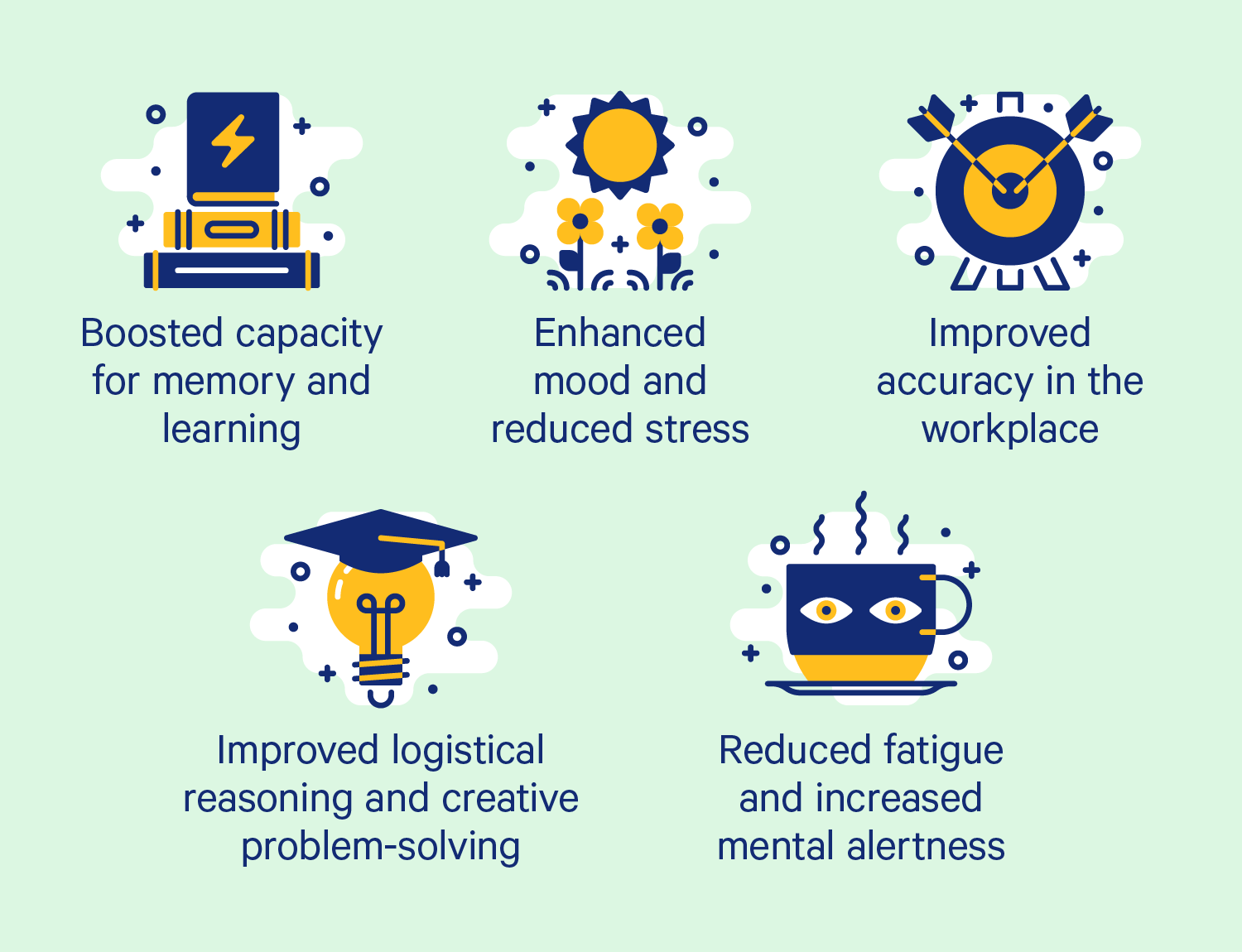What is a power nap? How long should a power nap be? What’s the ideal power nap time? Do you need to climb into a fancy nap pod to get the benefits of power naps?
We’re here to answer those questions in this blog article to power napping. We’ll talk about what power napping is, why it works, and how best to incorporate it into your life and routine.

What is power napping?
A power nap is a short period of sleep. It’s meant to supplement normal sleep and give sleepers a burst of alertness and energy.
You know how preschoolers lay down in the middle of the afternoon to give their minds and bodies a chance to recharge? The same approach works for adults, too, and research reveils we need it: 1 in 3 adults don’t get enough sleep.
How can power napping help?
We should all get 7-9 hours of sleep a night, say experts. But that’s sometimes difficult. Life gets in the way. We get hooked on a new show and don’t realize our bedtime passed three episodes ago. Work keeps us up late. Our children need us during the night. Anxiety wakes us up and makes it hard to fall back asleep.
When we get less sleep than we need, we build up a sleep deficit. Operating on less sleep impairs almost all aspects of body function. It worsens our reaction time, information processing, judgment, patience, and vision. Extended fatigue can also lead to stress, burnout, and moodiness.
Daytime naps can help us recover from sleep deprivation. They can reset our systems, replenish our energy levels, and improve our performance. A rested mind and body allow us to better engage in the activities that bring us meaning and with the people who bring us joy. Getting enough sleep, whether at night or during the day, helps us be more present in our lives.
Power napping works best if you already have a good sleep routine. If your body doesn’t fall asleep easily, you may want to work on improving that first. If not, taking naps during the day can make it even harder to fall asleep at night.
What are the benefits of power naps?
Quick answer: Return to the day more focused, present, and productive
Reaching for an espresso or a chocolate bar isn’t the only way to combat a mid-afternoon slump. Napping can actually be healthier than compensating for tiredness with coffee, according to the Behavioural Brain Research journal, since caffeine can decrease memory performance. You might get a burst of energy from a latte, but at the cost of lower-quality work.
Power naps, on the other hand, can help replenish energy while improving memory recall. They can also lead to more alertness and better mood.
Power napping and meditation both benefit the mind as well as the body. The benefits of taking a nap include reduced stress, lowered risk of heart attacks, and better concentration.
Healthy sleep is more about quality of rest than quantity of hours. A power nap, while short, can let our minds recharge and heal.
Setting up for a power nap
Many employers have recognized the benefits of power naps on work performance. Several companies offer opportunities to nap at work, including in dedicated spaces with sleek nap pods.
You don’t need fancy equipment to have a good power nap, though. Preschoolers get by with a dark room and a yoga mat, after all. With that in mind, consider these aspects of your napping set-up to get the most out of a power nap:
Location. If you don’t have a dedicated napping space available, find somewhere you won’t be disturbed and that has low noise levels. Is there an office or conference room you can use? A parked car can be a good option. If you work from home, try retreating into your bedroom.
Timing. Set an alarm for 20 minutes and make sure you don’t have anything to do right after it goes off. While you should wake up refreshed, not groggy, it’s best to give yourself a few minutes to transition back into work.
Distractions. Power down your computer and put your phone on silent. If you can’t get away from noise, try noise-canceling headphones, earplugs, or sleep music. You’ll get the best rest in a dark environment, so pull down the shades or try an eye mask.
Comfort. You’ll have an easier time falling asleep if you can lie down or at least recline. Our body temperature naturally drops in sleep, so pull a blanket or jacket over yourself so you stay warm as you nap.
To prepare the mind to get the most out of a power nap, we should approach it the same way we do sleep at night:
- Start with a relaxed, gentle focus
- Take a few deep breaths and close your eyes
- Let your mind slow and your body power down
If you use a guided meditation to help ease yourself into sleep, follow the instructions. If sleep music’s soothing baseline of sound allows you to relax and fall asleep, press play. And if you prefer to let your mind do its own thing, go for it.
As your thoughts fade and you drift off, let your mind and body rest.
Other aspects of power napping
Consistency. As strange as it sounds, napping is a skill — one that many of us have forgotten. It takes patience and perseverance to learn to power nap. Don’t get discouraged if you can’t fall asleep immediately or if your alarm goes off and you don’t feel like a new person. Like meditation, napping is something you get better at with practice. Try again tomorrow.
Managing expectations. Science tells us power napping has certain benefits, but how you experience them will be unique to your mind and body. Let yourself nap with an open mind as to how you’ll feel afterwards.
Find the right environment. Maybe your bed is too comfortable. Maybe your office chair isn’t comfortable enough. Modify your routine as needed: switch up the location, position, or time of day of your next power nap and try for different results.
Happy Power Napping




